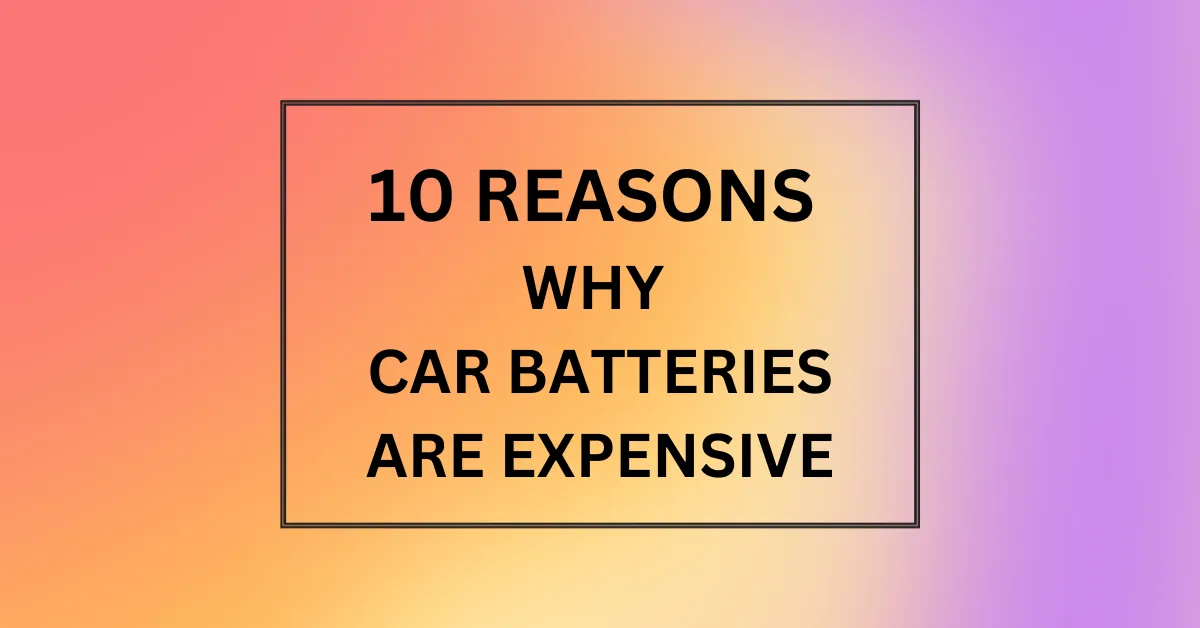Car batteries are expensive because they are complex, high-tech systems precisely engineered to deliver instant power on demand while withstanding tough automotive conditions for years. They also require custom production, strict safety standards, hazardous materials handling, inventory overhead, and specialized support—all factors that drive up costs. Ultimately, the price reflects the critical performance car batteries must provide.
Oh battery, why must you cost so much? Whether it’s time for a new car or that dreaded moment when your current battery unexpectedly dies, the price of a replacement often elicits groans. But before you start griping about the outrageous cost, let’s explore the reasons behind those triple-digit price tags.
Top 10 Reasons Why Are Car Batteries So Expensive?
1. More Than Meets the Eye
You might just see a plastic box, but car batteries are actually complex systems, precisely engineered to supply steady power. We’re talking specialty plates and connections, vent caps and valves, durable housings to withstand vibration and temperature extremes – not to mention all the research and development. Each component and design feature adds to manufacturing costs.
2. Batteries Go High-Tech
They aren’t your run-of-the-mill, basic batteries anymore. Today’s car batteries pack serious technology like sensors to monitor performance and warn of impending failure. Some even regulate their own power usage. Of course with advanced tech comes a higher price tag.
3. Power on Demand
Your battery provides a critical service – delivering the enormous jolt of power needed to start your engine while stabilizing voltage. Providing instant high energy output requires robust internal components that don’t come cheap.
4. Built to Last
Unlike that pack of AA’s in your TV remote, your car battery withstands repeated draining and recharging for years. That resilience and reliability requires high-grade materials and precise manufacturing controls, resulting in increased costs.
5. Custom Production
Car batteries aren’t one-size-fits-all. Battery size, type, terminal layout, and mounting specs differ across vehicle makes and models. Supporting this custom-fit production with specialty tooling and tailored assembly processes contributes to cost.
6. Strict Safety Standards
As an integral automotive component packed with acidic liquid and explosive gases, car batteries must adhere to rigorous industry safety regulations. Compliance testing and strict quality controls protect consumers but also drive up manufacturing expenses.
7. Inventory Overhead
Retailers must stock various specialty batteries to fit countless vehicle applications. Maintaining inventory of slower-selling items and providing availability as batteries phase in/out with automotive redesigns increases operating costs passed onto consumers.
8. Hazardous Materials Handling
From production to transport to recycling/disposal, car batteries require special handling as hazardous materials. Facilities must implement proper protections and control measures, with costs ultimately passed to purchasers.
9. Short Shelf Life
Even unused batteries deteriorate over time on store shelves and warehouses. Retailers adjust pricing models to cover aged stock losses from batteries expiring before sale.
10. Specialized Support is Spendy
Installing and servicing car batteries requires dedicated equipment, trained technicians, protective gear and appropriate disposal processes that most shops must pay for. These costs contribute to battery service/replacement charges.
FAQS.
Are car batteries good?
Yes, modern car batteries are extremely capable, using advanced technology to deliver reliable power to start your vehicle’s demanding electrical systems even in extreme conditions.
Are car batteries worth the price?
The higher cost of car batteries reflects their complex engineered systems that must provide critical, instant power delivery while withstanding years of recharging, so most would say they provide good value.
Where to buy car batteries?
You can purchase car batteries from automotive supply stores, battery specialty shops, and retailers like Costco or Sam’s Club, but confirm battery specifications match your vehicle make and model before buying.

